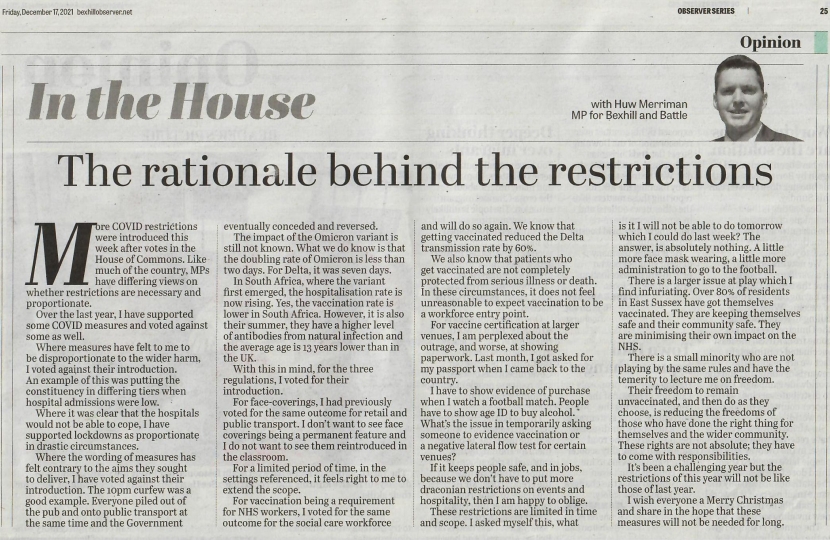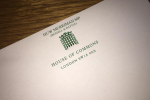
More COVID restrictions were introduced this week after votes in the House of Commons. Like much of the country, MPs have differing views on whether restrictions are necessary and proportionate.
Over the last year, I have supported some COVID measures and voted against some as well.
Where measures have felt to me to be disproportionate to the wider harm, I voted against their introduction. An example of this was putting the constituency in differing tiers when hospital admissions were low. Where it was clear that the hospitals would not be able to cope, I have supported lockdowns as proportionate in drastic circumstances.
Where the wording of measures has felt contrary to the aims they sought to deliver, I have voted against their introduction. The 10pm curfew was a good example. Everyone piled out of the pub and onto public transport at the same time and the Government eventually conceded and reversed.
The impact of the Omicron variant is still not known. What we do know is that the doubling rate of Omicron is less than two days. For Delta, it was seven days. In South Africa, where the variant first emerged, the hospitalisation rate is now rising. Yes, the vaccination rate is lower in South Africa. However, it is also their summer, they have a higher level of antibodies from natural infection and the average age is 13 years lower than in the UK.
With this in mind, for the three regulations, I voted for their introduction.
For face-coverings, I had previously voted for the same outcome for retail and public transport. I don’t want to see face coverings being a permanent feature and I do not want to see them reintroduced in the classroom. For a limited period of time, in the settings referenced, it feels right to me to extend the scope.
For vaccination being a requirement for NHS workers, I voted for the same outcome for the social care workforce and will do so again. We know that getting vaccinated reduced the Delta transmission rate by 60%. We also know that patients who get vaccinated are not completely protected from serious illness or death. In these circumstances, it does not feel unreasonable to expect vaccination to be a workforce entry point.
For vaccine certification at larger venues, I am perplexed about the outrage, and worse, at showing paperwork. Last month, I got asked for my passport when I came back to the country. I have to show evidence of purchase when I watch a football match. People have to show age ID to buy alcohol. What’s the issue in temporarily asking someone to evidence vaccination or a negative lateral flow test for certain venues? If it keeps people safe, and in jobs, because we don’t have to put more draconian restrictions on events and hospitality, then I am happy to oblige.
These restrictions are limited in time and scope. I asked myself this, what is it I will not be able to do tomorrow which I could do last week? The answer, is absolutely nothing. A little more face mask wearing, a little more administration to go to the football.
There is a larger issue at play which I find infuriating. Over 80% of residents in East Sussex have got themselves vaccinated. They are keeping themselves safe and their community safe. They are minimising their own impact on the NHS. There are a small minority who are not playing by the same rules and have the temerity to lecture me on freedom.
Their freedom to remain unvaccinated, and then do as they choose, is reducing the freedoms of those who have done the right thing for themselves and the wider community. These rights are not absolute; they have to come with responsibilities.
It’s been a challenging year but the restrictions of this year will not be like those of last year. I wish everyone a Merry Christmas and share in the hope that these measures will not be needed for long.



